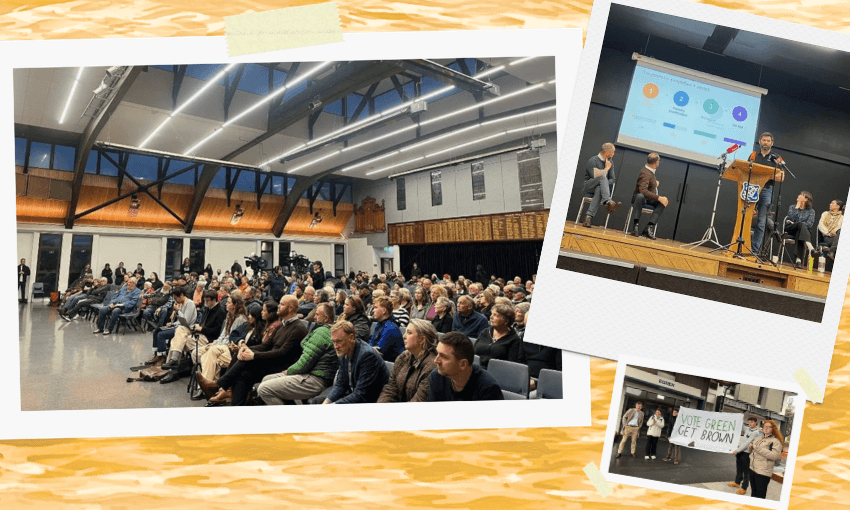Woop woop, that’s the sound of the last week in parliament for a month.
Echo Chamber is The Spinoff’s dispatch from the press gallery, recapping sessions in the House. Columns are written by politics reporter Lyric Waiwiri-Smith and Wellington editor Joel MacManus.
The last-week-of-school jitters tend to manifest as making students feel either tense, stressed or absolutely devoid of any fucks they may have given so far in the first term. After this week, our hard-working MPs will have a month off from this place, allowing them some time for things like casual photo ops and regrettable Twitter posts. For some, maybe the thought of another term in the big House is enough to make them want to quit altogether.
Hipkins v Luxon kicked off question time in its usual fashion, but in a rare move for the prime minister, he chose to compliment the opposition party – more specifically Labour’s outgoing foreign affairs spokesperson, David Parker. “You have huge respect across the House,” Luxon said. “We want to thank you for your service to this House and to this place, and importantly, also, for the intellect and the passion.”
It was what Brownlee had been begging for for weeks: some inter-House unity, the display of a parliament functioning in partnership. “Well, that’s very nice,” he said. “Can we go to question two now, or …”
The brief moment of allyship was quickly lost to old tempers. The opposition was back to laughing and barracking over Luxon’s statements when Hipkins’ questioning came to climate change, which earned a call of “fake news!” from NZ First minister Shane Jones.
Asked by Hipkins to name “one major policy change” from his government that had reduced the nation’s emissions, Luxon responded: “I can name several of them.” It’s just a shame those several policies couldn’t be heard over the heckling from the opposition benches. Luxon went in to bat for his foreign affairs minister Winston Peters, who recently questioned whether New Zealand made the right decision in joining the Paris Climate Agreement.
“We have some crocodile tears from the leader of the opposition,” Luxon cried. “[Peters] is hugely respected by everybody in the foreign affairs community, and I am very proud of the work that he’s doing. I just would compare and contrast his record versus your record in government.
“Gerry was a good foreign affairs minister,” Hipkins offered.
“Yeah, but I wasn’t a part of your government,” Brownlee replied, to a chorus of applause from the government benches. “There, I’ve broken my neutrality. How bad’s that?”
Questioning came around to the police minister Mark Mitchell, who was prompted to display his unwavering dedication to the force by his National colleague Grant McCallum. “Oooh, yes,” the voice of National backbencher Rima Nakhle singing praises for the minister sounded slightly too loudly across the House. Faces on the opposition side looked at each other with equal confusion and disgust – who was the bootlicker in the back trying to make their voice heard?
As Mitchell relayed an outing with Wellington’s community beat team, the whimperings echoed again. “Of course he has [visited the beat patrol], cause he’s awesome” – there was Nakhle’s voice again. “Oh, what a great minister,” she crooned. Greens co-leader Chlöe Swarbrick and her colleague Ricardo Menéndez March just looked at each other with unrepressed contempt.
It was then Bishop’s turn to butt in. “Has the minister received any positive feedback about the Wellington beat team from the member of parliament for Wellington Central?” Bishop asked, to eye rolls from the Greens.
“Unfortunately, no …,” Mitchell replied. He would have continued, had it not been for busy Brownlee’s badgering. “OK, that’s enough,” he grumbled. “Sit down.”
But as Mitchell descended to his seat, National’s Paul Goldsmith ascended to call for a supplementary. Channeling his alter-ego Pāora, he asked the police minister: “Is it the government’s policy to ‘defund da police’, and if not, why not?” No, it wasn’t his Ngāti Epsom dialect coming through – the Treaty negotiations minister was referencing recent faux pro-Green Party billboards erected by the Sensible Sentencing Trust.
Mitchell grinned and rose to his feet, but Brownlee was unimpressed with the giggles from the government benches – what a riot that Goldsmith is, saying “da”. McCallum got a verbal clip around the ears from the speaker for laughing a little too loudly for him to hear Mitchell’s response: “Mr McCallum, would you like to leave the House or not? Don’t make a noise while a question’s being asked.”
“No, it’s not this government’s policy to ‘defund da police’,” Mitchell said. “Thank you,” Brownlee responded. It’s not a Green Party policy either, but hopefully now that National has had the thrill of being youth-adjacent by using “da” in da House and cementing it in da Hansard, we can finally move on.





